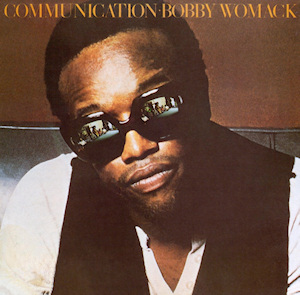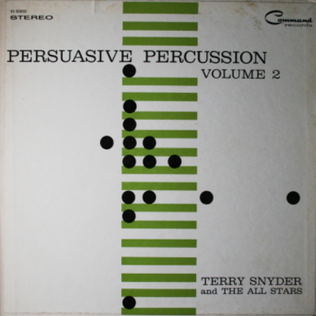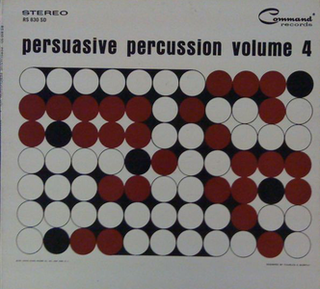
Speaking in Tongues is the fifth studio album by American rock band Talking Heads, released on June 1, 1983, by Sire Records. After their split with producer Brian Eno and a short hiatus, which allowed the individual members to pursue side projects, recording began in 1982. It became the band's commercial breakthrough and produced the band's sole US top-ten hit, "Burning Down the House".
Enoch Henry Light was an American classically trained violinist, danceband leader, and recording engineer. As the leader of various dance bands that recorded as early as March 1927 and continuing through at least 1940, Light and his band primarily worked in various hotels in New York. For a time in 1928 he also led a band in Paris. In the 1930s Light also studied conducting with the French conductor Maurice Frigara in Paris.

Persuasive Percussion was an LP album performed by Terry Snyder and the All Stars and released in 1959 by Command Records. The packaging includes the first use of the gatefold cover which, upon being unfolded, lists information about each selection. The liner notes state that the album may be used to test audio equipment, due to the stereo placement of sounds independently in either the left or right channel. The album cover artwork, by Josef Albers, is minimalistic in style, consisting of an arrangement of dots. The album was the first volume in a series of Persuasive Percussion releases. Provocative Percussion was the second release of the Percussion albums. Both Persuasive Percussion and Provocative Percussion had four volumes released over the next several years.

Caravanserai is the fourth studio album by American rock band Santana, released on October 11, 1972. The album marked a period of transition for Santana as it was the band's last to feature several key early members, while shifting in a more instrumental, progressive jazz fusion direction. It sold in fewer quantities than the band's previous chart-topping albums, stalling at No. 8 on the Billboard LPs chart, but has been critically acclaimed.
"Dream", sometimes referred to as "Dream ", is a jazz and pop standard with words and music written by Johnny Mercer in 1944. He originally wrote it as a theme for his radio program. It has been and performed by many artists, with the most popular versions of this song recorded by The Pied Pipers, Frank Sinatra, and Roy Orbison.
Anthony C. Mottola was an American jazz guitarist who released dozens of solo albums. Mottola was born in Kearny, New Jersey and died in Denville.

Orphans: Brawlers, Bawlers & Bastards is a limited edition three CD set by Tom Waits, released by the ANTI- label on November 17, 2006 in Europe and on November 21, 2006 in the United States.

C'est Chic is the second studio album by American R&B band Chic, released on Atlantic Records in 1978.

Communication is the third studio album by American musician Bobby Womack. The album was released on September 15, 1971, by United Artists Records. It reached No. 5 on the Billboard R&B chart and No. 20 on the Billboard Jazz Chart in 1972. It included the hit single, "That's The Way I Feel About Cha", which charted at No. 2 on the Billboard R&B Singles chart and No. 27 on the Billboard pop chart. The album became Womack's breakthrough spawning the hit single "That's The Way I Feel About Cha" and a favorite Womack album track, "(If You Don't Want My Love) Give It Back", which Womack recorded three times after the original, the first remake, a slower acoustic version, was issued on the soundtrack of the film, Across 110th Street, and an instrumental by J. J. Johnson's band. The fourth time Womack recorded it was with Rolling Stones singer and musician Ron Wood. Womack recorded his own versions of James Taylor's "Fire and Rain", Ray Stevens' "Everything Is Beautiful" and featured a spoken word monologue in his cover of the Burt Bacharach and Hal David standard, "(They Long To Be) Close to You".

"So Sad " is a song written by Don Everly, which was released by The Everly Brothers in 1960. The song was later a country hit for multiple artists in the 1970s and 80s.

Quiet Village: The Exotic Sounds of Martin Denny was the eighth album by Martin Denny. Released in the summer of 1959, the monophonic version of the album reached No. 21 on the Billboard monophonic album chart in November 1959, and the stereophonic version reached No. 12 on the magazine's stereophonic album chart in January 1960.

"Theme from The Apartment" is a tune composed by Charles Williams. The song was originally released in 1949 and entitled "Jealous Lover", and was originally featured in the 1949 film The Romantic Age.

Stereo 35/MM, later reissued under the title Enoch Light And His Orchestra At Carnegie Hall, is an album by Enoch Light and His Orchestra. It was released in 1961 on Command Records. The musicians performing solos included Doc Severinsen, Phil Bodner, and Bobby Byrne.

Provocative Percussion is a studio album by Enoch Light and The Light Brigade, also known as the Command All-Stars. It was released in 1959 on Command Records. The album cover artwork is by abstract painter Josef Albers, like its predecessor.

Persuasive Percussion Volume 2 is a studio album by Terry Snyder and The All Stars. It was produced by Enoch Light and released in 1959 on Light's Command Records label. The featured musicians included Tony Mottola, Willie Rodriguez, Dick Hyman, Jack Lesberg, Teddy Sommer, Artie Marotti, Stanley Webb, and Dominic Cortese.

Persuasive Percussion Volume 3 is a studio album by The Command All Stars. It was produced by Enoch Light and released in 1960 on Light's Command Records label. The featured musicians included Tony Mottola (guitar), Doc Severinsen (trumpet), Bobby Byrne (trombone), Bobby Haggart, Phil Bodner (piccolo), and Stan Webb (saxophone). The album cover artwork is by abstract painter Josef Albers.

Persuasive Percussion Volume 4 is a studio album by Enoch Light and The Command All Stars. It was produced by Enoch Light and released in 1961 on Light's Command Records label.

I Want to Be Happy Cha Cha's is a studio album of cha-cha-chá music by Enoch Light and The Light Brigade. It was released in 1959 on the Grand Award label.
Provocative Percussion Vol. III is a studio album by Enoch Light and the Light Bregade. It was produced by Enoch Light and released in 1961 on Light's Command Records label. The featured musicians included Tony Mottola (guitar), Doc Severinsen (trumpet), Bobby Byrne (trombone), Bob Haggart, Phil Bodner, and Stanley Webb. The album cover artwork is by abstract painter Josef Albers.















